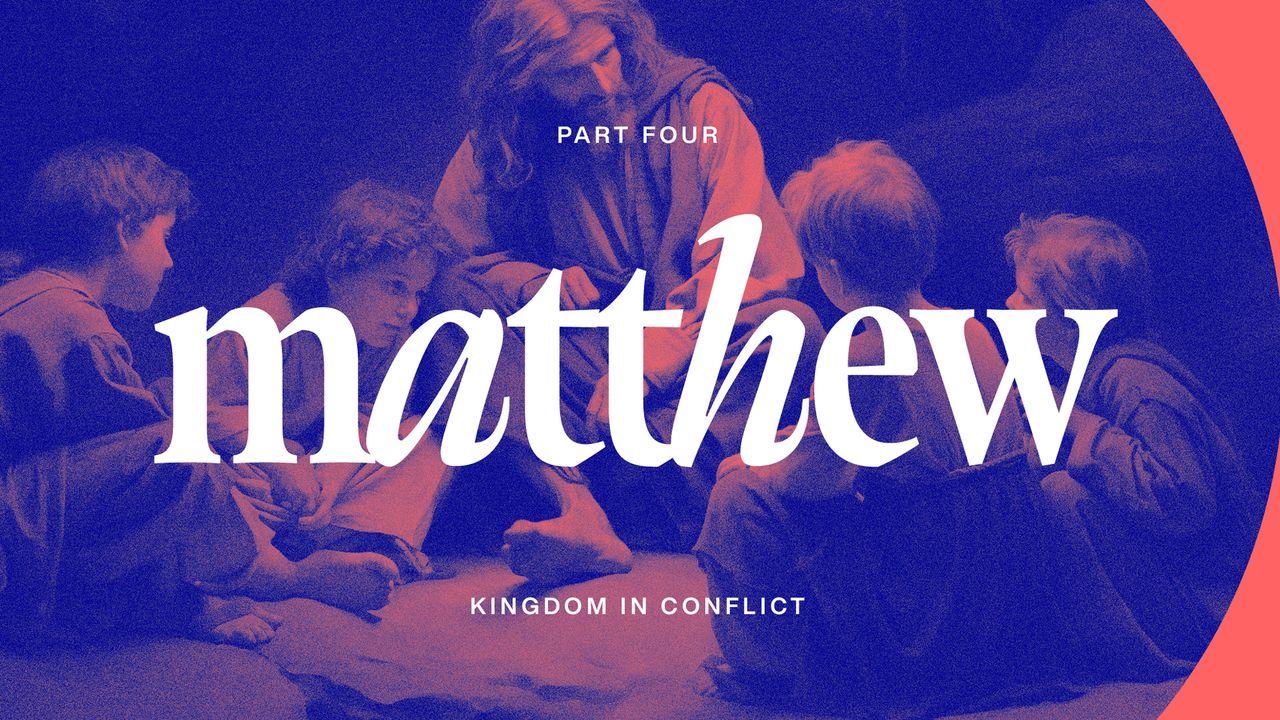Matthew 13-20: Kingdoms in Conflictਨਮੂਨਾ

The Dangers of Religiosity
By Romina Chevren
“When they went across the lake, the disciples forgot to take bread. ‘Be careful,’ Jesus said to them. ‘Be on your guard against the yeast of the Pharisees and Sadducees.’ They discussed this among themselves and said, ‘It is because we didn’t bring any bread.’ Aware of their discussion, Jesus asked, ‘You of little faith, why are you talking among yourselves about having no bread? Do you still not understand? Don’t you remember the five loaves for the five thousand, and how many basketfuls you gathered? Or the seven loaves for the four thousand, and how many basketfuls you gathered? How is it you don’t understand that I was not talking to you about bread? But be on your guard against the yeast of the Pharisees and Sadducees.’ Then they understood that he was not telling them to guard against the yeast used in bread, but against the teaching of the Pharisees and Sadducees.”—Matthew 16:5–12 (NIV)
I love the story relayed in today’s verse of Scripture because not only does it tell us about how often the disciples misunderstood Jesus as we often do, but also, it reveals God’s compassion by warning us about the dangers of a religious spirit.
We don’t know how much time elapsed between chapters 15 and 16 in Matthew, but only a few versus earlier, Jesus fed more than 5,000 people with seven loaves of bread and a few fish. We’re told there were seven basketfuls of leftovers, which is a lot of extra food!
Now, as they’re heading across the lake, the disciples realized they forgot to bring bread with them. I imagine they were still so shocked over the miracle Jesus performed that they completely overlooked a minor detail like packing lunch for their trip.
Earlier, the Pharisees and Sadducees tried to test Jesus by asking Him for a sign from heaven, and I can picture Jesus replaying the conversation in His mind as they’re sitting in the boat. While it’s still fresh, He decides to share His thoughts with the disciples and warns them of the yeast of the Pharisees. The disciples completely missed the point (as they often did) and thought Jesus was upset they didn’t bring food for the journey. In other words, they were focused on their physical reality rather than the spiritual one.
But what did Jesus really mean?
In the Bible, yeast is often associated with sin—and ironically, the Pharisees were the most careful people in all of Israel when it came to avoiding it. They added more than 600 laws to the 10 commandments to prevent them from sinning against God. They fasted and prayed regularly. They tithed on everything they owned, including the herbs from their gardens. They studied the Bible from a very early age and would memorize entire books at a time. No one was more zealous for God than these people.
How can you fault a person for pursuing God with such devotion? Honestly, if the Pharisees were around today, I think they’d be leading many of our churches by their example. And yet, Jesus didn’t warn His disciples about the corrupting influence of sinners—the tax collectors, drunks, and prostitutes the Pharisees looked down on. Instead, He warned them about the most devout, religious people around them. Why?
Because Jesus understood that while the religious elites studied the Scriptures diligently and did everything they could to be in right standing with God, they missed the point entirely. In their pride and arrogance, they thought they could earn their way into heaven. That’s what’s so dangerous about the religious spirit that’s still alive and well today.
God’s law was never about earning our way into His favor or us building a bridge to Him; it was intended to reveal the true nature of our sinful condition (Romans 7:7–25) and our need for a Savior. It exposes our need for grace and the righteousness that only Jesus could purchase for us on the cross. Man can never build a bridge to a right relationship with the Father; only the Son can do it—and He did! It isn’t about the bread we bring on the journey; it’s about the bread of life He provides us along the way.
Pause: Why do you think Jesus focused His warning on the yeastof the Pharisees and not on sinners and the influence they might have on His disciples? What do you think He’s saying about the nature of religion? Of righteousness?
Practice: Take a moment to do a heart check with the Holy Spirit. Are you checking off the religious boxes when it comes to reading your Bible, prayer, giving, serving, etc.? Do you sense any pride or self-righteousness when it comes to how well you’re doing in your Christian walk?
Pray: Jesus, thank You for Your Word and warning to the disciples about a religious spirit. Reveal to me areas in my life where I’m still trying to earn Your approval, favor, or love by the things I’m doing, rather than based on what You did for me. Free me from a religious spirit, Lord! Forgive me, cleanse me, renew me, and empower me to walk in the freedom You paid for me on the cross. Amen.
ਪਵਿੱਤਰ ਸ਼ਾਸਤਰ
About this Plan

In part four of this verse-by-verse breakdown of the Gospel of Matthew, we'll work our way through Matthew 13-20.
More
Related Plans

Walk With God: 3 Days of Pilgrimage

Deeper in Worship

Moses: A Journey of Faith and Freedom

Faith-Driven Impact Investor: What the Bible Says

Spirit-Led Emotions: Mastering Emotions With Holy Spirit

YES!!!

Psalms of Lament

I'm Just a Guy: Who Feels Alone

Prayer Altars: Embracing the Priestly Call to Prayer
